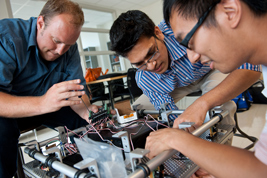McCormick Announces Master of Science in Robotics Program
Full-time, one-year program will prepare students for careers as robotics engineers
Northwestern University’s McCormick School of Engineering and Applied Science is pleased to announce its new Master of Science in Robotics (MSR) degree, an interdisciplinary program designed to prepare college graduates for careers as robotics engineers.
The full-time, one-year program will draw upon McCormick’s strengths in mechanical engineering, biomedical engineering, mathematics, electrical engineering, and computer science to provide promising graduates the skills they need to succeed in the cutting-edge fields of robotics and artificial intelligence.
"Robotics is an incredibly fast-growing field, and the job opportunities for graduates in robotics are rapidly expanding," said Todd Murphey, associate professor of mechanical engineering at McCormick and director of the MSR program. "It is challenging to obtain the technical breadth required for a career in robotics in an undergraduate program, so a one-year MS program makes sense for those students who want to work in robotics.”
 Applications are being accepted now for the first class, which will commence in fall 2014.
Applications are being accepted now for the first class, which will commence in fall 2014.
Featuring a combination of traditional and project-based courses, the MSR program will provide training in multiple areas relevant to robotics applications in defense, manufacturing, and healthcare, taught by faculty from McCormick as well as the Rehabilitation Institute of Chicago and the Feinberg School of Medicine.
Course subject areas will include automatic control, kinematics and dynamics, machine learning, path planning, human-machine interfaces, biomedical engineering, neuroscience, robotic rehabilitation, and prosthetics.
Students will have the opportunity to participate in a diverse set of robotics research projects with faculty from all over Northwestern, including the Neuroscience and Robotics Laboratory, a world leader in robotics, haptic interfaces, and biomedical engineering. Project areas include multi-robot systems, robotic manipulation, haptics, simulation and control of multibody systems, swarm robotics, bio-inspired sensing and control, and prosthetics engineering.
Connections to the robotics industry will play a significant part in the program through seminars, networking events, and projects from leading industrial partners. Students will be encouraged to participate in industrial internships.